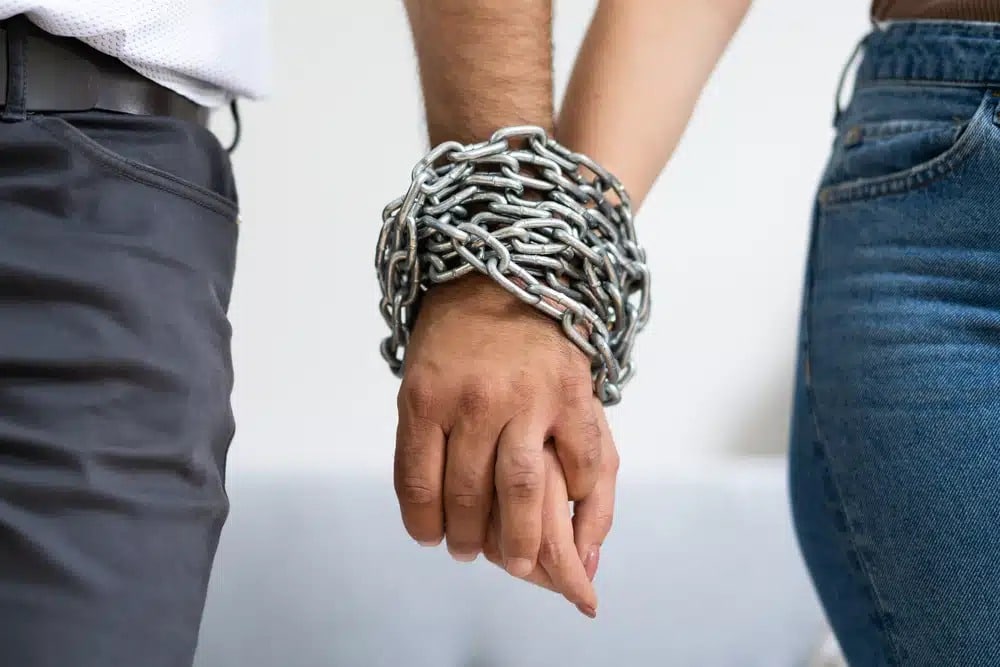We rely on others in our lives to assist us occasionally. We may seek guidance when making significant decisions and cherish the presence of our loved ones. Healthy relationships naturally involve some level of dependence, fostering confidence and mutual trust. However, dependency can sometimes exceed healthy limits, making individuals feel incapable of meeting their needs and resulting into codependent personality disorder.
Good relationships are built on a balance of giving and receiving, meeting the needs of a loved one while also fulfilling personal needs. Both individuals prioritize the relationship, yet they can also find happiness in other activities, friends, and hobbies. They openly express their concerns and needs, and their reliance on each other is mutual, with a high value placed on the relationship.
Both codependency and dependency can create issues and impede healthy relationships. It is crucial to distinguish the fundamental variances between the two. An individual may neglect their own needs in favor of fulfilling the needs of another, driven by a desire to feel essential. However, if an individual experiences intense self-doubt, struggles to make decisions independently, feels powerless, or fears being alone, these behaviors can be indicative of having characteristics of both codependency and dependent personality disorder (DPD).
At Laguna Shores Recovery in Orange County, California, our rehab facility helps people struggling with various behavioral health conditions learn how to effectively manage them to mend relationships and live healthier.
What is Codependency?
Codependency is more of a characteristic than a personality disorder. It refers to an unhealthy dynamic in which one partner depends heavily on another to validate their self-esteem. It can impact individuals with mental health issues but is not classified as a mental disorder. In codependent relationships, one partner often assumes the role of a “rescuer” for the other, which fulfills their need to feel essential.
Bonding and attachment are natural and necessary parts of human relationships. Within healthy boundaries, they help people thrive. When people develop an extreme attachment or dependence on other people in their lives, this might lead to codependency.
In the field of addiction and recovery, the topic of codependency often has to do with the enabling of addiction by family members. Codependency also shows up in relationships that tend to produce mental health risks like dysfunctional family dynamics, low self-esteem, anxiety, and depression. Many people are not aware that codependency may have to do with personality disorders.
What Are the Signs of a Codependent Personality?
A codependent person finds it hard to say no or set boundaries in relationships. They may feel the need to be liked by everyone or compelled to take care of others. The other party in the relationship may or may not reciprocate the feelings of dependence. Codependent people often have a low sense of self-worth outside this relationship. Extreme dedication to it may lead to neglect of other responsibilities in life.
Codependent relationships are unhealthy because they do not leave space for wholesome relationship traits to grow and flourish. Both parties usually become too invested in each other to function independently. Codependent people feed off the other person’s neediness and devote all their energy to them. Though being devoted and caring for another person is not a bad thing, it becomes codependency when there are things like constant tension, manipulation, emotional stifling, or even trauma associated with the relationship dynamics on one or both sides. Things can spiral into a cycle of codependency, making intervention very challenging.
The challenge of having a codependent personality is that this condition is not yet considered a diagnosable mental health issue. However, the medical community has increasingly recognized the connection between behavioral patterns of codependency and certain personality disorders. Common signs of codependency may include:
- Depending on another person for personal happiness
- Staying in a relationship despite the other person’s hurtful behavior
- Prioritizing the other person’s needs above all else
- Difficulty expressing personal needs or feeling guilty when doing so
- Feeling anxious in a relationship but struggling to end it
People with codependency may gravitate towards relationships where they can take care of someone else, leading to self-defeating and compulsive caregiving. The more they care for someone in need, the more dependent that person may become on their support, creating a cycle of dependency.
This dynamic can trap both individuals in the roles of victim and rescuer, disempowering the person in need of support. To cope, those with codependency may resort to harmful behaviors like substance abuse or gambling, in addition to the development or worsening of a mental health disorder.
What Causes Codependency Disorder?
Like all psychological traits, a codependent personality disorder can be traced back to childhood experiences. That is when one’s sense of self, independence, and self-worth form, as supported and shaped by family and other significant relationships. Family culture systems have the power to shape people and relationships.
Codependent adults often exhibit signs of childhood trauma or have challenging relationships with their parents or caregivers. Their behaviors are often learned from their caregivers, who taught them that their own needs are less important than those of others in their lives. The following factors are closely linked to codependency:
Family DynamicsCodependence is often intertwined with dysfunctional family roles. For instance, adults with codependency may have been repeatedly told during their childhood that they were insignificant and that their emotions were not acknowledged by important adults. If they attempted to prioritize their own needs, they might have been labeled as selfish or greedy.
Living with a Physically or Mentally Ill Family MemberAssuming the role of a caregiver from a young age can contribute to codependent behavior in adulthood. Taking care of a family member with a substance dependency, for instance, can create a cycle of codependency later in life. Research indicates that individuals who grow up with parents who struggle with substance abuse often face challenges in forming meaningful and healthy relationships in the future.
Codependency can also come later in life, like if one person in a relationship often takes charge and the other allows them to make many decisions for them. Overprotective parents, for example, tend to create patterns of fear and anxiety early on that feed into a child’s personality. Lack of parental engagement and emotional fulfillment, on the other hand, may disrupt the healthy trajectory of personality development. In some families, codependency has existed for generations and the cycle may seem difficult to break.
Is Codependency Diagnosis Considered a Mental Illness?

The Diagnostic and Statistical Manual of Mental Disorders, 5th Edition (DSM-5), offers a comprehensive structure for identifying symptoms and categorizing behavioral health conditions. Since 1986, professionals in the field of mental health have debated whether codependency should be officially recognized as a mental health condition. They have suggested using diagnostic criteria from other disorders such as dependent personality disorder, borderline personality disorder, histrionic personality disorder, and even post-traumatic stress disorder (PTSD).
Despite efforts to establish codependency as a recognized disorder, these attempts have not been successful. The most recent set of diagnostic criteria, known as the DSM-5, only acknowledges dependent personality disorder as an official diagnosis, excluding codependency.
Opponents argue against having a separate diagnosis for codependency, claiming that it shares too many similarities with other mental health conditions to warrant its classification. For instance, codependency symptoms significantly overlap with dependent personality disorder (DPD) and borderline personality disorder (BPD).
However, recent research indicates that while individuals with codependent personalities may display traits from both DPD and BPD, there are also those with codependency who do not exhibit symptoms from either disorder. This suggests that codependency is a distinct mental health condition.
What Are the Dangers of Being in a Codependent Relationship?
Because of its harmful and lasting effects, codependency has been referred to as “relationship addiction.” The behavior is often subconscious, especially for people who have a codependent personality disorder and define their self-worth through their various relationship statuses.
People with codependent personality disorders tend to directly interfere with their loved one’s emotional health by excessive caretaking and controlling. They may be preoccupied with people and things outside themselves but have difficulty identifying and communicating their internal feelings because of a fear of true expression. The other person’s real needs are often neglected. The obsessive need for approval is compounded by an exaggerated responsibility for the other person.
Codependency may turn people into enablers of their loved one’s bad behaviors. Examples include bailing someone out, repeatedly giving them another chance, ignoring or denying the problem, accepting excuses, feeling they can be the other person’s “savior,” or coming to the rescue of a misbehaving friend or family member.
People with codependent personality disorder may be unable to see the issues within themselves and very seldom fix the problem on their own. Codependency coupled with substance addiction can be particularly complicated because people in a relationship with someone with past or current substance use issues may enable the problem or their behaviors might trigger cravings or relapse.

The Connection Between Codependency Personality Disorder and Addiction
The coexistence of codependency and addiction is a common occurrence within relationships. When an individual grapples with a reliance on substances like drugs or alcohol, their loved ones can play a crucial role in supporting them to seek help and find the motivation to undergo the recovery journey. However, codependent relationships can have an adverse impact. If a person with a substance use disorder is in a relationship with a codependent individual, it can make the process of overcoming the addiction even more challenging.
Likewise, a codependent person may face difficulties in their recovery process due to their inclination to assist and enable the individual with substance dependence. Relationships involving someone with an addiction and a codependent partner often become self-destructive and will persist in this manner unless appropriate intervention is implemented.
Key Differences Between Codependent and Dependent Individuals
The similarities between codependency and dependent personality disorder revolve around issues of dependency. In codependency, a person relies on another individual needing them, while in dependent personality disorder, an individual is reliant on the care provided by another person. In both conditions, the individual’s sense of self is distorted, hindering personal growth and healthy development within and outside of the relationship. Both conditions promote unhealthy relationship dynamics.
Individuals with a mental health condition such as a personality disorder may display codependent traits, but there is no specific diagnosis for “codependent personality disorder.” It is important not to confuse this term with dependent personality disorder (DPD), which is an established condition.
Being reliant on a relationship can be a positive attribute that nurtures healthy relationships. Conversely, being codependent is detrimental to both the individual and the relationship. There are distinct disparities between a dependent person and a codependent person:
Dependent
The relationship is a priority for both people, but happiness can be found in other interests, friends, and pastimes. Both people in a relationship can express their concerns and needs openly. Reliance on each other is mutual, and both individuals value their relationship highly.
Codependent
The relationship is one-sided in caring for the interests of one person in the relationship. Happiness is dependent on caring for the other person, often including sacrifices at the expense of the codependent person. Outside interests are severely limited as time and energy are focused on caring for the other person. The expression of personal needs and wants is considered unimportant or is not taken into consideration at all.
What are the Differences Between Dependent Personality Disorder and Codependency?

Dependent Personality Disorder (DPD) shares the most overlap with codependency. The primary distinction between Dependent Personality Disorder and codependent people is the nature of the relationship.
Codependent individuals tend to display dependent traits focused on a specific person, while dependent personality disorder refers to dependent traits toward others in general. Similarly, a person with borderline personality disorder struggles with stability in interpersonal relationships, while codependency involves a specific dependence on an individual.
At the most basic level, codependency is a psychological condition in which persons feel an extreme dependence on certain loved ones in their lives. This dependence often progresses to the point where affected individuals feel responsible for the dependents’ actions and feelings. As the condition progresses, it may affect self-perception and esteem.
Signs of codependency tend to result in one-sided relationships, either through an excessive focus on one’s own needs or an excessive focus on a partner’s needs. The dependency issues associated with codependency and DPD can be detrimental to meaningful relationships and personal development.
Although distinct, they can contribute to a negative emotional cycle in personal, social, and professional contexts. The initial step in seeking treatment is identifying the problem. Here are some key distinctions between codependency and DPD:
- A codependent individual craves the need to be needed
- A codependent individual derives self-worth and life satisfaction from caring for another person, with minimal regard for personal needs
- An individual with DPD desires and requires extreme levels of care
- An individual with DPD dreads being alone and depends on another person to make everyday decisions
Codependency
Codependency refers to a type of behavior within a relationship that is characterized by extreme and unbalanced actions, all to help or please the other person involved. Individuals who exhibit codependency have a strong desire to be needed and are willing to make significant sacrifices to prioritize the needs and wants of the other person over their own.
Life is centered around the needs of significant others, and personal needs are overlooked in favor of the other person. Self-worth and satisfaction are tied to caring for and being needed by the other person, and personal pursuits and interests are absent or limited.
Codependency causes a relationship to become unbalanced, focusing solely on the needs of one individual. The codependent person’s happiness is contingent upon caring for the other, often at the expense of their well-being. Their outside interests are severely limited, as they dedicate their time and energy to the other person, neglecting their own needs and desires.
It is common for codependent individuals to derive their self-worth from being indispensable to others. Some typical signs and symptoms of codependency include:
- Low self-esteem
- Dysfunctional family dynamics
- Depression and anxiety
- Stress
- Inability or difficulty expressing emotions, personal needs, or desires, and feeling guilty when doing so
- Having a hard time saying no or setting boundaries
- Reacting with strong emotions, even to small incidents
- Finding happiness solely in the act of caring for another person
- Choosing to remain in a relationship despite enduring hurtful behavior
- Placing the needs of the other person above all else, often neglecting their own
In addition, a codependent often feels compelled to take care of others and feels a need to be liked by everyone. Intimacy issues, fear of abandonment, and confusing love with pity are common traits. As a whole, these symptoms pertain to a single person or family as opposed to dependent personality disorder, where the symptoms apply to people within the social network as a whole.
Dependent Personality Disorder (DPD)Dependent personality disorder is characterized by a strong need for others and a reliance on them. In addition to occasional clinginess, individuals with DPD experience anxiety and a fear of separation. They lack true independence in all aspects of life and rely on others to make everyday decisions for them.
Not leaving the house because the significant other is staying at home, not making decisions about clothing or food choices without advice from the significant other, or submitting to abusive behavior out of fear of the other person leaving is indicative of characteristics of someone with dependent personality disorder.
In their pursuit of care, support, and approval, individuals with DPD tend to avoid conflicts and accept treatments that they may not otherwise agree with. Common behaviors and symptoms associated with DPD include:
- Difficulty making decisions without seeking excessive advice or reassurance from others.
- Not taking responsibility for major areas of life.
- Being passive and avoiding disagreements due to fear of disapproval.
- Discomfort with being alone and difficulty in taking care of oneself.
- Quickly seeking a new relationship after the end of a previous one.
Someone avoiding leaving the house because the significant other stays at home, deferring decisions on clothing or food choices to the advice of the significant other, or tolerating abusive behavior due to fear of the other person leaving are signs of unhealthy behaviors and dependent traits.
If you or someone you know exhibits signs of DPD or codependent behavior and is grappling with alcohol or substance use, reach out to Laguna Shores Recovery for assistance. Our representatives can discuss suitable treatment plans.
Codependent Personality Disorder Treatment

Evidence-based interventions such as cognitive behavioral therapy (CBT), motivational interviewing, and individual and group therapy sessions may be necessary for the treatment of codependency. Taking a holistic approach to the individual and the family unit, considering co-occurring issues like addiction and mental illness can provide valuable guidance for the treatment plan. It is important to consult with a professional to determine the most suitable approach for dealing with codependency during drug addiction, as strategies can vary.
While codependency may not be an officially recognized diagnosis, it is a distinct psychological concept that significantly impacts both the individual and the dynamics within the family. Recognizing the signs and symptoms of codependency, as well as its role in fueling substance use disorders and dysfunctional family roles, is crucial. Codependents can inadvertently enable drug dependence in their partners or friends, while individuals with substance use disorders may serve as enablers to codependents.
Breaking this cycle of codependency can be challenging without appropriate intervention and treatment. The recovery process for codependency requires a tailored approach that takes into account the dynamics of relationships.
How is the Cycle Of Codependency Broken?
The first step toward breaking the cycle of codependency is gaining awareness of the subconscious motivations. Both parties in the relationship need to work out boundaries so that they can both thrive as independent individuals without stifling one another. For some relationships, this can be a natural learning process, but codependent relationships often need external intervention from experienced mental health experts to identify and remedy these problems.
Evidence-based interventions such as cognitive-behavioral therapy (CBT), motivational interviewing, and one-on-one therapy may help treat codependent personality disorder. Recovery from this condition may require a more personalized approach that is determined by relationship dynamics.
People with substance addiction may live with family members who are codependent and enabling. Codependency can bring many adverse outcomes to relationships in general, but especially ones where substance use is or was involved. If you experience codependency in a relationship, you can work with health professionals who are experts in the intersection of addiction recovery and mental health.
At Laguna Shores in Orange County, CA, we offer comprehensive, evidence-based interventions for drug and alcohol dependence, as well as behavioral health conditions. Our recovery coaching services and family therapy sessions aim to help individuals and their families understand the importance of support in the recovery process.
Laguna Shores Can Help Break the Cycle
Our team of licensed mental healthcare professionals and therapists can help you. We understand the complexity of codependence and addiction in the family system. Our evidence-based approaches have helped many clients rebuild their family relationships and social lives.
We coach them on key relationship skills and integrate this into their relapse prevention plan. Our full medical residential facility offers a range of treatments, including diagnosis, behavioral therapies, and 12-step programs. With the help of the caring staff at Laguna Shores Recovery, you can overcome addiction and codependency. Call us today.

 Matthew Beck B.A, M.A, LMFT
Matthew Beck B.A, M.A, LMFT 


